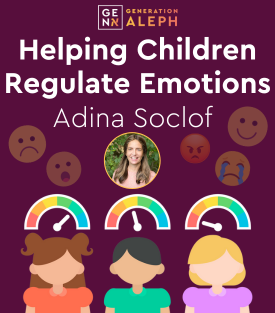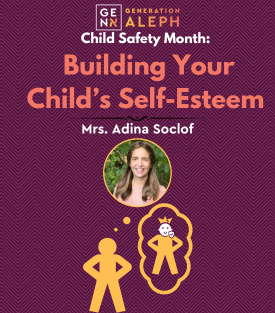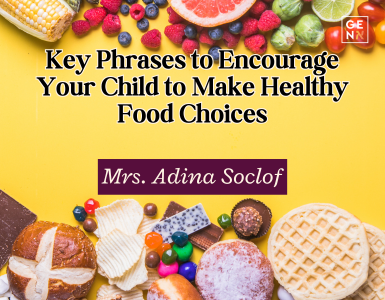When it comes to my kid’s eating habits, I felt like I had done everything wrong. My kids were picky eaters and I vacillated between bribing them to eat and giving up and just letting them eat what they wanted. I also went back and forth between, keeping healthy foods in the house and then giving up on that and stocking my pantry with lots of nosh and sweets.
Of course, there’s the stereotype of the Jewish mother, constantly wanting to feed her children. Finally, our Jewish lifestyle, holidays, Shabbos, most rituals, revolves around food. Needless, to say, I was confused.
But it’s never too late to learn. In many of my parenting classes, I talk about “Go-to” phrases that can help us parent better and more efficiently. I’ve compiled the “Go-to” phrases you need to help your child make healthy choices around food. Phrases, that I wished I had had, when my kids were younger.
To help role model good eating habits:
The best way to teach your child anything is by role modeling. Show your children how to have a healthy relationship with food by using the “talk aloud” technique. This is where, in earshot of your children, you talk about how you cultivate your healthy eating habits. You don’t mention anything about their eating.
You can say:
“When I eat vegetables and fruits it gives me so much energy!”
“Look out how pretty these fruits and vegetables look on my plate!”
“Hmm, this looks interesting. I am going to try this new food.”
“This carrot is orange, that’s how you know it is has Vitamin A in it. I learned that is how you keep your eyes healthy.”
You also want to avoid any negative comments about your food intake:
“I’m so bad for eating this candy.”
“This cookie is going to make me so fat!”
“I’m on a diet, so I can’t eat that.”
Instead say:
“I am full for now!”
“This salad gives me so much energy!”
“When I make healthy choices, I feel so much stronger.”
Enjoying different foods:
Most experts agree, we want to avoid teaching our kids that our love or approval hinges on what they eat. We don’t want to say:
“It will make me so happy if you just try this!”
We also want to avoid using food as a reward for good behavior:
“If you sit still, you will get a candy…”
We certainly want to avoid using it as a reward for eating healthier food. This just puts junk food on a pedestal- giving it a higher status. When we say, “Finish your broccoli and I’ll give you candy.” They hear, “Candy is better than broccoli.”
A better way to encourage children to eat, is to point out the sensory aspects of the food:
“Carrots make a crunch sound when we eat them.”
“Grapes and plums are alike, they are both purple, round, and sweet!”
You can even say, “Let’s try this and see if we can describe it to each other…”
Being thankful:
We want to show respect and gratitude for our food. According to Jewish law, we shouldn’t waste food or even talk badly about it.
My children’s kindergarten teacher would admonish them gently during lunch, when they said, “I hate corn!” or “Yucky”. She taught them to say, “I don’t care for that.” or “It’s not my taste!” I tried to reinforce this concept at home.
Everyone is different:
Another aspect of respecting and being grateful for our food is teaching children that everyone has their own food preferences.
We can say:
“Isn’t it funny, how one person can like something, and another person doesn’t? Everyone’s tastebuds are so different!”
“Which food is your favorite?”
“Everybody likes different foods, don’t they?
5.Coercion vs. encouragement:
Part of eating healthy is being open to new foods. To help children expand their palate we want to avoid saying:
“Just try it! You will like it!”
“What is the big deal?”
“See, it didn’t taste so bad!”
Pushing children to do something they don’t want to do, usually ensures that they will dig their heels in, even more.
It’s better to say:
“You tried it even though you weren’t sure…”
“Trying new foods can be challenging…you did it…”
Making independent choices:
Healthy eating is integral to our well-being. Children need to be able to make good decisions about their food, even when we are not there.
I always recommend using the following phrases to promote independence overall:
“You know what’s right for you.”
“You know how to make good decisions.”
They teach kids to look into themselves and recognize, they can use good judgment. We can apply them to food choices:
“You know what food are right for you.”
“You know how to make good decisions about what to eat for dinner…”
“You made some healthy food choices.”
Mind your own hunger:
We also want to help children take ownership over their food intake, listening to the hunger and satiation signals of their body.
We can say:
“Is your stomach telling you that you’re full?”
“Is your stomach still making its hungry growling noise?”
“Has your tummy had enough?”
The most important phrase of all:
Many of the phrases mentioned above can help parents avoid power struggles over food, but the one that really does the trick is this:
“You don’t have to eat it…”
When children sense that we want to control what they eat, they rebel big time. Short of force feeding, we hold little sway over what they put in their mouths. The fact is children are more likely to eat when there is no pressure to do so.
Serving family style, where children get to pick their food themselves from a variety of foods, can also relieve some of the pressure associated with picky eating.
Stress-free meals:
We can even take it one step further and say:
“You can choose to eat your dessert before or after dinner.”
According to Natalia Stenasko, in her article “5 Phrases That Bring Peace to Mealtimes”:
“Presenting the dessert along with the rest of dinner seems contrary to all of our nutritional beliefs. In reality, this is a great way to take the “magic” away from dessert. Using dessert as a reward has proven to be counterproductive in teaching children to like other food. Showing the dessert upfront also relays to the child that dessert will happen no matter what they eat for dinner. Again, autonomy is very important. Don’t fret if they eat dessert before dinner the first few times. If you get the serving size right (think one chocolate chip cookie), they will be still hungry for dinner after eating it. And don’t forget, fruit also makes excellent dessert!”
Helping children make healthy choices about food is within reach. I hope these phrases can help you do just that.
References:
Choosemyplate.gov
https://karacarrero.com/7-genius-phrases-to-banish-picky-eating-for-good/
https://www.cnbc.com/2023/04/22/never-use-these-toxic-food-phrases-if-your-kid-is-a-picky-eater-says-parenting-expert-and-dietitian.html
https://www.mother.ly/food/nutrition/help-kids-eat-less-sugar/
https://feedingbytes.com/2013/06/5-phrases-that-bring-peace-to-mealtimes/
Submit your questions
"*" indicates required fields










